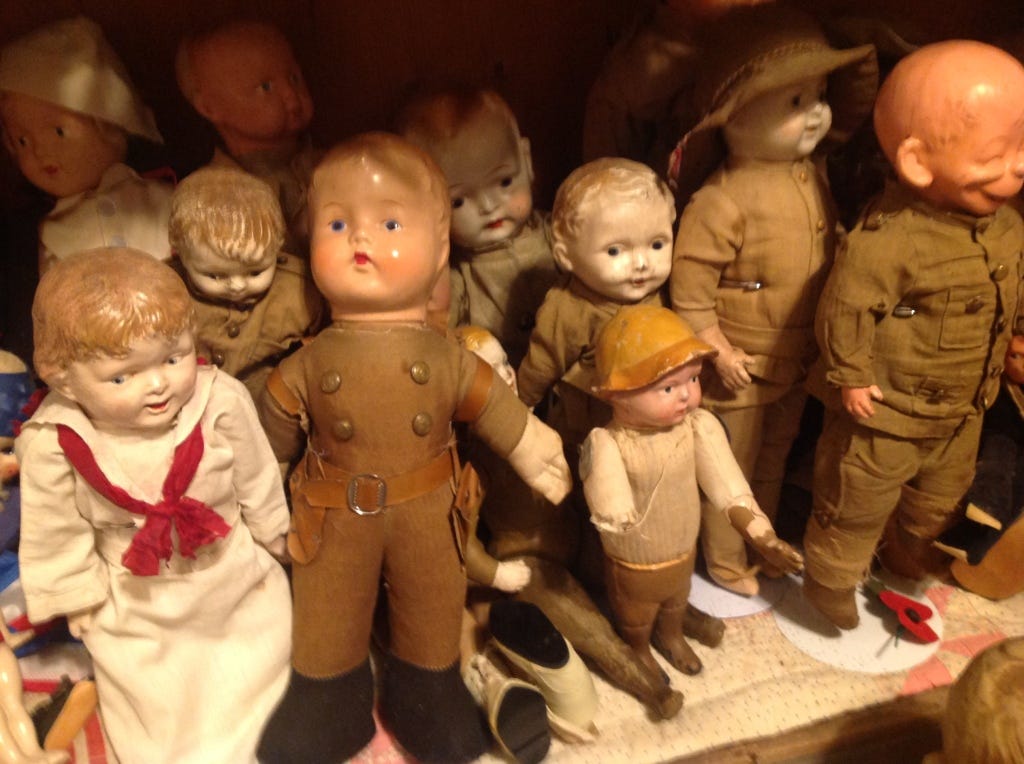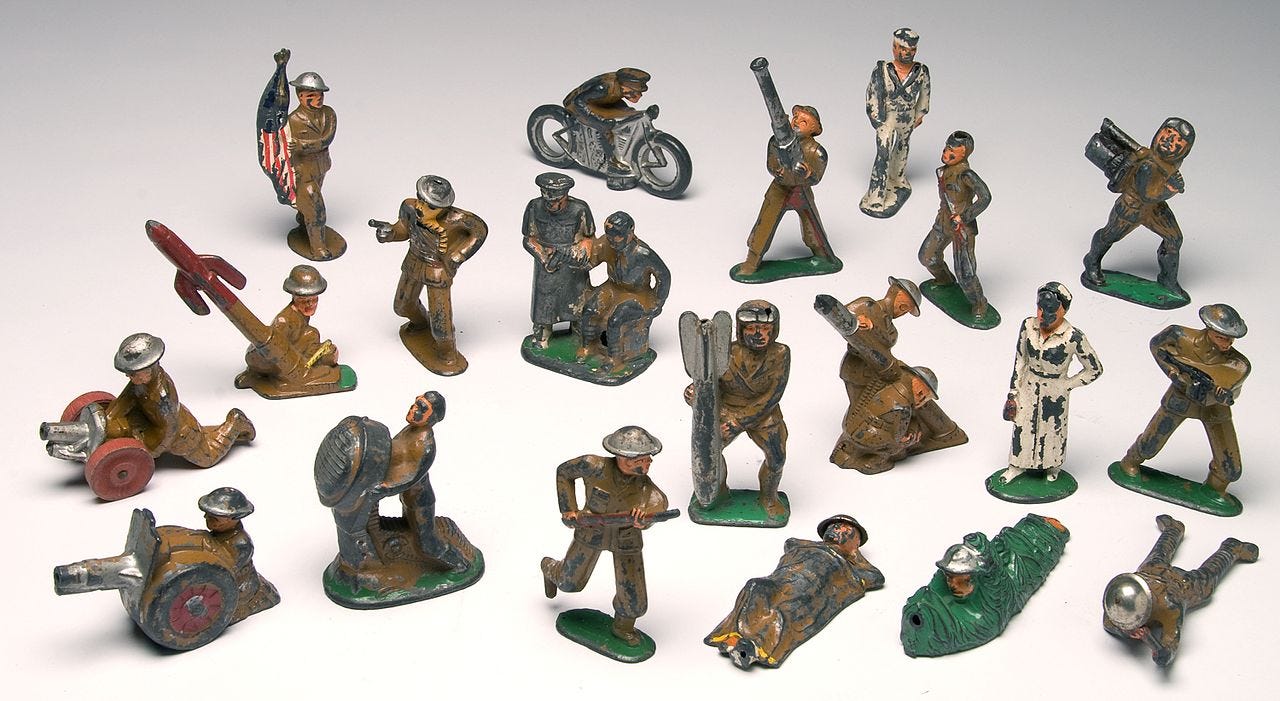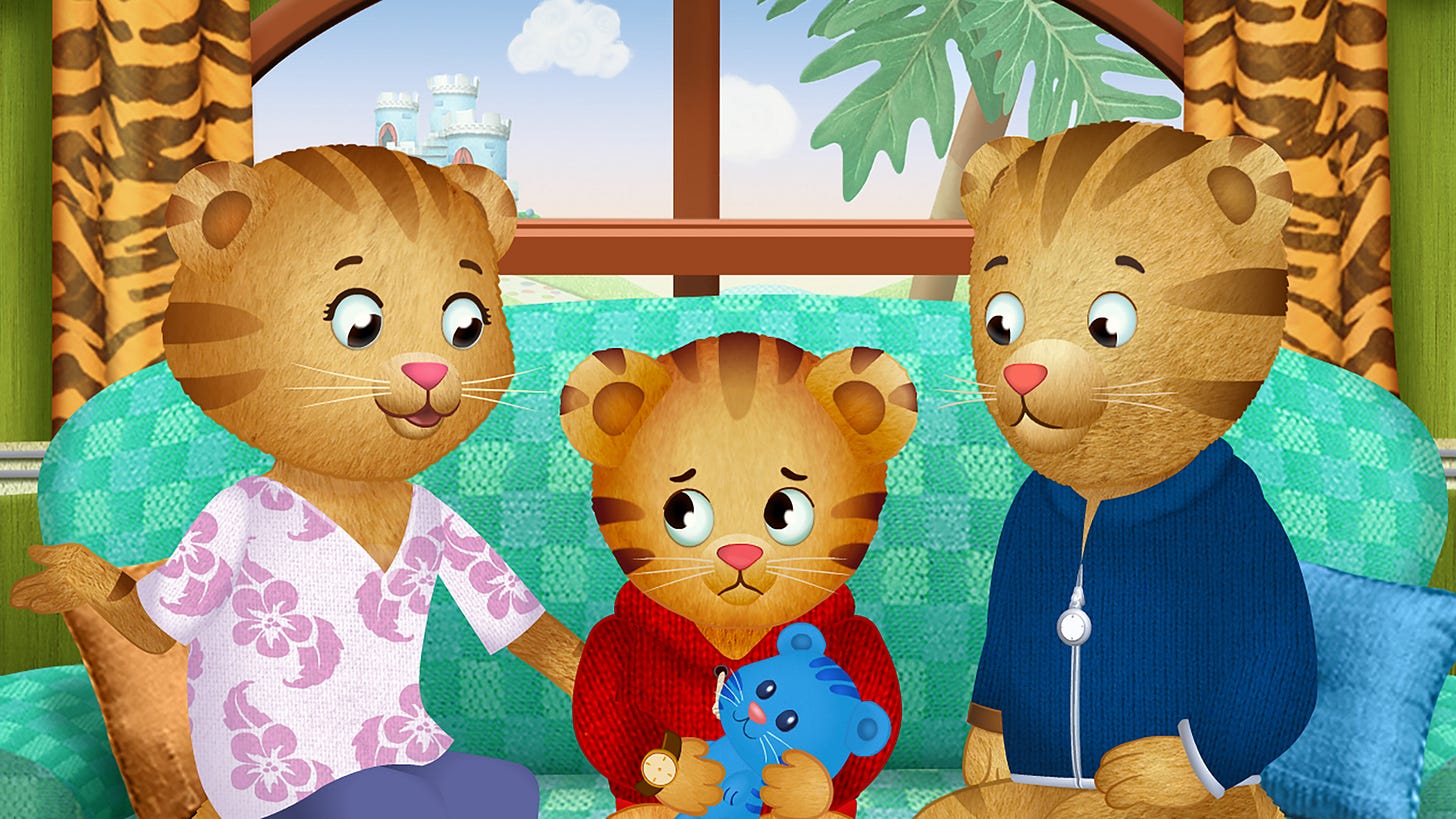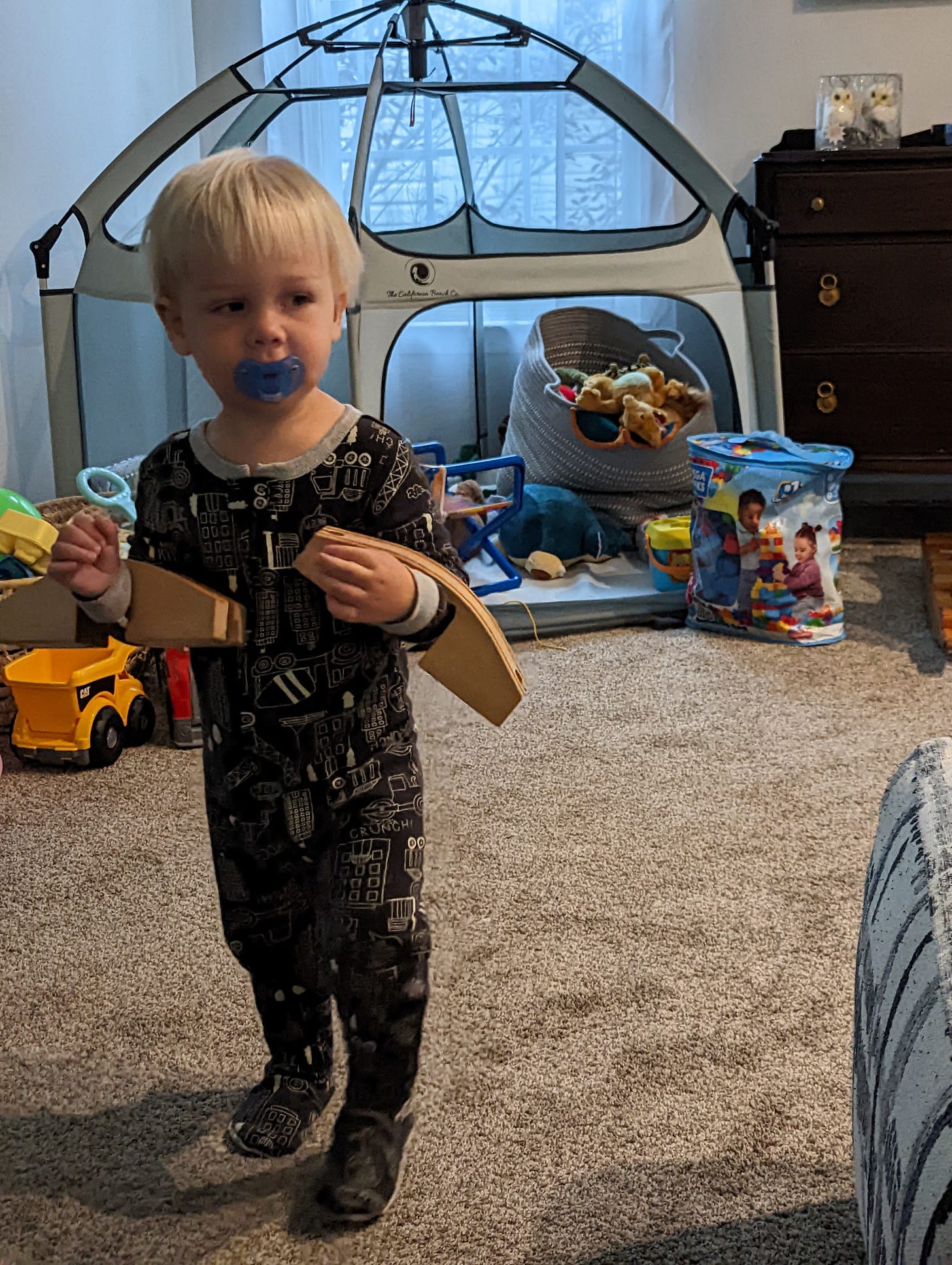This piece is inspired by a prompt at the Soaring Twenties Social Club, “the home of the 2020’s artistic renaissance,” founded by Thomas J. Bevan. This Symposium’s theme is, “Work”.
I.
My mom loves to watch Thomas the Tank Engine & Friends with my son. It’s nostalgic for her, and for me; when I was just a little older than Rowan is now, I had all those stories memorized and could recite them from the fireplace in a perfect Ringo Starr accent.
I don’t know how many times I repeated Sir Topham Hatt’s iconic line, “You’re a really useful engine, Thomas,” while messing my diaper.
The words strike a sour note with me now. Maybe because I spent a good deal of graduate school studying how contemporary society reduces us to the products of our labor. It’s weird, hearing that propagandistic message choo-choo’d at my two year old by an anthropomorphic train.
Of course, I’m overthinking this. I am an heir of the Theory Generation, over-educated and doomed to read everything from gas prices to my cop neighbor’s tennis shoes with close and conspiratorial attention. If I’m going after Thomas, it must be because I’m looking for a fight, right?
If so, I’m not the only one. In 2017, the New Yorker ran a scathing expose of the Sodor Island train lines. With her tongue loosely in her cheek, Jia Tolentino details the conservative excesses of Thomas’s very British creator, and the many fascist goings-on in Sir Topham Hatt’s yard. How, for instance, Thomas would choot contempt at his so-called “friends” as they were hauled off for dismemberment and scrapping because he was more “useful” than they.
Dani Di Placido offered a more measured reading in Forbes back in 2020.1 Comparing Thomas favorably to the smooth and glistening walls of the uncanny valley that is Paw Patrol, Di Placido notes Thomas’s subtle satire of British working culture; he praises the show for teaching children that interpersonal relationships can be rough and grumpy, and that this needn’t be the end of the world.
Meanwhile, Di Placido turns his ire against Paw Patrol for its at once saccharine and cynical world in which there’s absolutely no reason why people can’t be perfect and helpful with one another all the time:
[In children’s media,] the point of friends fighting is that they eventually make amends, and understand why the conflict arose… But Paw Patrol doesn’t care to show its characters navigate the treacherous landscape of friendship; it just wants to sell toys to your children.
Di Placido notes that the show makes its sales pitch through a “formula” of collapsing characters into a uniform soup of “helpfulness,” which—are my compasses spinning, or does that also sound an awful lot like “usefulness” to you, too?
II.
I noticed even before I read Di Placido’s article that there was something rotten in the state of Fisher Price as much as on Hulu.
Rowan’s toys can also get strangely preoccupied with his work ethic. He’s got a little plastic mining rig through which he can drop boulders, or haul them with cranes and elevators. All the while, a computerized voice chirrups that he’s a hard worker and that he should put all his focus on doing a good job.
I do a good job, too, in my own way, keeping multiple disparate feelings together. I’m grateful that his grandparents have gotten him such a cool toy, while acknowledging to you all that generational trauma is having some kind of field day with me and now I’m trying to figure it out.
There’s a legacy here worth mining. Toys have a long and studied history of being used as propaganda. They’ve enforced racial segregation or stoked national pride. More recently, they’re designed to “recruit” children into the logics of late capitalism that will dominate their adult lives.
The International Encyclopedia of the First World War offers some insights into the advent of toys as a “market.” In 19-20th Century Europe, the mass manufacture of toys for children proceeded directly from the rise of industrialization. In Britain especially, mass-produced toys were a way to advertise the nation’s wealth and success.
Toys also reflected the deepening impact of war on European identities. They encouraged children to identify with specific roles, often related to combat: toy planes, toy soldiers, parachuters and the scrubs of combat-medics. When those roles weren’t directly related to war, they reinforced a sense of national identity and professionalism. By encouraging children to identify with laborers, toys had a way of feeding back into the economy that produced them.
This form of manufacturing dropped off after World War II, but the idea of toys as social models for (especially very young) children remains. In a lengthy post from 2013, Gene Howington reviews a replica drone marketed to children on Amazon, and the multiple hilarious reviews it’s received. In the process, he makes the insightful observation that one can discern a toy’s potential for propaganda based on its degree of abstraction.
Highly abstract toys like LEGOs or Lincoln Logs encourage imaginative play. They are potent, often in pieces, and allow children to project their own meanings onto the objects. (Related lesson: nothing beats a stick in the woods.)
The less abstract a toy is, the more likely it is to be a vehicle for a message. When only “one degree abstracted from reality”—like a replica drone—the toy encourages the child to imaginatively inhabit its represented version of the world instead of incorporating the toy into their own imagination. It sets the child up to practice fulfilling a function, to conform to a ready-made identity.
This isn’t automatically a bad thing. Some roles are worth imitating. Nothing makes me happier than when Rowan pulls out his little singing vacuum cleaner to help us with chores around the house. When I head to the stove to cook, he goes to his own little toy kitchen to chop Velcro vegetables. The nearness of the toy to reality, in this case, greases the mimetic circuits that make him want to be like Mommy and Daddy, and that is undeniably good.
It might also have been good a century ago, when toys didn’t only indoctrinate children into nationalist militancy but also helped them cope with the realities of war and parental absence. The age domesticated hope, horror and heroism into a little brown man you could fit into your palm.
And yet this slippery place between play and training has a dark underside that, these days, feels much harder to miss. “All designed objects,” says philosopher Alain de Botton, “are propaganda for a way of life.” The question is, which life? And is that life a good one?
Maybe I’m reading into my child’s entertainment because it feels like we’re all presently asking the question, “What is the good life, and is this really it?” Now that we’ve already “read way to much into” all this, as Di Placido warned us not to, there’s really nowhere else for us to go but further down into that question.
III.
I can’t exactly trace my adult neuroses back to a particular toy and its insidious lessons. Like Di Placido notes, Thomas the Tank Engine probably didn’t indoctrinate me into the idea that being a “useful engine” was my ultimate destiny. It didn’t even recruit me into capitalism, as my Dad made all my wooden tracks himself.
But I did listen as other authority figures taught me these lessons. Some even used examples from playtime or from television. Teachers clarified what I was supposed to be learning from Sesame Street and Mister Rogers’ Neighborhood. I know that I imbibed the lesson of being “useful” above all because, and for a long time, my “way of life” tacitly treated life itself as a means to an end.
So I’ve become nostalgic for the Fred Rogers spirit, longing to be told that there’s no one on earth just like me and that I made today special just by being me. I wonder, are there places where my children can hear that message again?
Kind of. Many kids’ shows have taken on the Rogers mantle. Daniel Tiger, the spiritual successor to Mister Rogers’ Neighborhood, expresses the same ideals of human uniqueness and the validity of feelings, teaching important skills of mindfulness and self-regulation.
The rub here is context. These skills are no longer novelties in 2022. Once upon a time, the message that “you’re special just the way you are” was counter-cultural, even dangerous. Now there is an entire cottage industry of mindfulness and self-care repeating this message to make people happier and healthier.
I don’t think it’s because we’re enlightened. I think’s it’s because a happier and healthier you is likely to be more productive.
I’ve been hard pressed lately to find any takes on mindfulness that don’t foreground productivity as their ultimate goal. Self-knowledge and authenticity are marketed as antidotes to wheel-spinning in the C-suite. The assumption is that we will be all be better workers the less distracted we are by life’s existential weights.2
Perhaps this is why even spirituality gets economically overcoded in our brave new content-driven world.3 A recent article in Religion News Service presents religion as a cross-generational salve for today’s mental health epidemics. The report describes religion’s usefulness (!) for teaching teens to emotionally regulate and ground themselves. It reflects no great interest in metaphysical truth, or the ultimate coherence of the story we tell ourselves about our place in the cosmos, or the purity of curiosity that even gives rise to the question, Who is God?
It cares, rather, about whether the stories people pick are working for them. And “working”, here, means—when considering every context and paratext of our lives—that it gives you the tools of emotional management that grease your participation in a highly productive society.
How inconvenient is the eros of truth, the pure desire to know, the raw momentum of inquiry that distracts us from all this work that needs doing.
We’re beyond “reading too much into things.” Now it’s hard not to see my kids as targets. To see that these lessons about emotional management and work ethic are going to form the orthodoxy of their lives, and that more and more of their pointless play and genuine inquiry and even their worship will be wrangled to serve its doctrine.
IV.
The religion bequeathed to us by Silicon Valley is Stoicism which, when ground down by the bastards, feeds cleanly into our productive lives. Whether it be Sesame Street for the kids or guided meditations for adults, we’re all encouraged to follow that Delphic directive to “know ourselves.”
By “knowing” oneself as one “knows” a lawnmower manual—by caring for ourselves in rituals of regularly-scheduled maintenance—we remain slick and functional in the social machine.
Our language of “self care” can no longer evoke that ancient ideal of attending to oneself, being preoccupied with one’s own useless (because miraculous) existence.4 If we were really taking care of ourselves, the world—as the few and the powerful would have it—would implode. We would rediscover work as that necessary but regrettable interruption of more important things, and then where would we be?5
Caught up, perhaps, into the vitality of Fred Rogers, who elevated the care of the self to its properly divine place. His was a genuine theology of uselessness, a transcendent interruption that might yet break into the bureaucratic hell we have made for ourselves and called heaven, harrowing it with this thing called life.6
But if we would notice when this good life lances into the dark, perhaps we need to stop looking for the apocalypse. We must admit that the perpetual revelation of propaganda in a world like ours means very little by itself; that tearing the veil from our children will not save them.7 They’re watching us to see where our attention goes, after all; what happens if I give all my attention to telling my kids that they are more than “useful engines”?
They need to see me finding and digging at the more, too. To see me looking for the grace jostling between ornery box cars. They need me to be curious about abstract toys, tabletop games, and sticks in the woods that we can pretend are scepters—to be the one inviting all these objects into our imaginary lives instead of trying to conform our imaginations to identities smuggled off assembly lines. They need me to build sandcastles instead of going to work, to make rules and then break them, to give them all the tools they need to one day recognize that power is itself little more than a game.8
And, as much as I do it for them every day, they need to see me reach across the fence to that neighbor I don’t like, and tell him, “Hey man, you made today special—just by being you.”
Yes, there are two take-downs of Thomas the Tank Engine appearing in major publications in the last 5 years, not counting actual published academic research on the topic.
You might guess that this isn’t the first time I’ve spilled ink over all this.
See Jeffrey T. Nealon, Post-Postmodernism: Or, the Cultural Logic of Just-In-Time Capitalism (2012)
Michel Foucault, The Hermeneutics of the Subject (1982)
“Like all attempts at thinking inoperativity, [Malechiv’s Inoperativity and Lafargue’s The Right to Be Lazy remain] trapped in a negative determination of [their] own object, since [they] define inoperativity only e contrario with respect to labor. While for the ancients it was labor—negotium—that was defined negatively with respect to contemplative life—otium—moderns seem unable to conceive of contemplation, inoperativity, and feast otherwise than as rest or the negation of labor.” (Giorgio Agamben, The Fire & The Tale, p.53)
See Agamben, Homo Sacer II.4, 519-20. I feel closest to this hope when Rowan and I watch the show Bluey. It exults in the imagination, in the porosity of family roles, in the conviviality of knowing all the rules to your neighbors’ kids’ games. It bucks all questions of “use” by teaching and failing its lessons in equal measure. There is nothing we are supposed to learn at the end of an episode of Bluey; rather the insights are available to those who watch these characters, who never rise to the level of propaganda because they’re too busy living the good life.
Nealon, Post-Postmodernism. See also Rita Felski, The Limits of Critique, 2015.
“One day humanity will play with law just as children play with disused objects, not in order to restore them to their canonical use but to free them from it for good.” (Agamben, State of Exception, p.64)







Your essay is comprehensive and thorough without ever once dragging - I could see multiple longer essays as offshoots from this one and I would read them all! It also makes me want to be more curious about how I used to play as a kid vs how kids play nowadays, as well ask all my friends what they played! Being a Gen X-er, a lot of us were just outside wreacking havoc. Great essay!
"Mindfulness will decrease your anxiety, help you accomplish more, and make you better at math!!"
"That's okay; I'll do it anyway."
***
A thought-provoking essay, Lyle. Thank you.